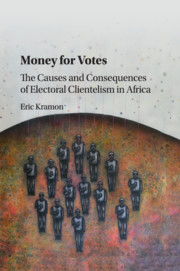Book contents
- Frontmatter
- Contents
- List of Tables
- List of Figures
- Acknowledgments
- Part I The Puzzle of Electoral Clientelism
- Part II Empirical Evidence
- 4 The Mechanics of Electoral Clientelism: Descriptive Evidence
- 5 Why is Electoral Clientelism Effective?: Experimental Evidence
- 6 Who Invests in Electoral Clientelism?: Incumbents versus Challengers
- 7 Electoral Clientelism and Ethnic Politics
- 8 Electoral Clientelism and the Provision of Local Public Goods
- 9 Conclusion
- Appendices
- Bibliography
- Index
7 - Electoral Clientelism and Ethnic Politics
from Part II - Empirical Evidence
Published online by Cambridge University Press: 26 October 2017
- Frontmatter
- Contents
- List of Tables
- List of Figures
- Acknowledgments
- Part I The Puzzle of Electoral Clientelism
- Part II Empirical Evidence
- 4 The Mechanics of Electoral Clientelism: Descriptive Evidence
- 5 Why is Electoral Clientelism Effective?: Experimental Evidence
- 6 Who Invests in Electoral Clientelism?: Incumbents versus Challengers
- 7 Electoral Clientelism and Ethnic Politics
- 8 Electoral Clientelism and the Provision of Local Public Goods
- 9 Conclusion
- Appendices
- Bibliography
- Index
Summary
Politicians in Kenya are cunning; they have always been able to convince their tribesmen that if leadership is from their community they are in a better position to access government jobs, resources, infrastructure, and so on.
Interview respondent in Kakamega, Kenya, January 2015Scholarly and journalistic accounts of African politics often emphasize the important role of ethnic identity. The notion that ethnicity is important on the continent underpins dominant theories of voting behavior (Bratton and Kimenyi, 2008; Posner, 2005), elite coalition building (Arriola, 2009), the production and distribution of public goods (Franck and Rainer, 2012; Habyarimana et al., 2009), and the structure of economic markets (Fafchamps, 2002). Further, the salience of ethnicity in politics is often linked to a number of poor development outcomes, including slower economic growth (e.g., Easterly and Levine, 1997; Montalvo and Reynal-Querol, 2005) and the under-provision of public goods (e.g., Habyarimana et al., 2009; Miguel and Gugerty, 2005).
This chapter examines the connection between electoral clientelism and ethnic politics, testing the informational theory's implications for the local ethnic demographic conditions in which electoral clientelism is likely to bemost effective. In the Kenya context, where ethnicity is highly salient, the informational theory implies that electoral clientelism should have the most impact on voting decisions in conditions where political candidates cannot be distinguished by their ethnic identity. This hypothesis follows from the fact that, for both historical and psychological reasons, ethnic labels tend to send a signal to voters about how likely candidates will be to support their interests and channel resources to them (Chandra, 2007; Conroy- Krutz, 2012; Ferree, 2006; Posner, 2005). In races with a diverse candidate pool, electoral clientelism will convey information, but it will not be the only heuristic upon which voters can rely, diminishing its overall impact and importance. By contrast, in areas where candidates are all members of the same ethnic group—a large proportion of parliamentary and local government races in Kenya—voters cannot rely on ethnic labels to differentiate candidates. In these contexts, the information conveyed by electoral clientelism should be most influential.
The evidence in this chapter is drawn from two sources. First, I return to the list experimental and survey data about Kenya's 2007 elections introduced in Chapter 2. With those data, I show that electoral clientelism was most effective in ethnically homogenous districts where parliamentary candidates are generally members of the same ethnic group.
- Type
- Chapter
- Information
- Money for VotesThe Causes and Consequences of Electoral Clientelism in Africa, pp. 140 - 160Publisher: Cambridge University PressPrint publication year: 2017



